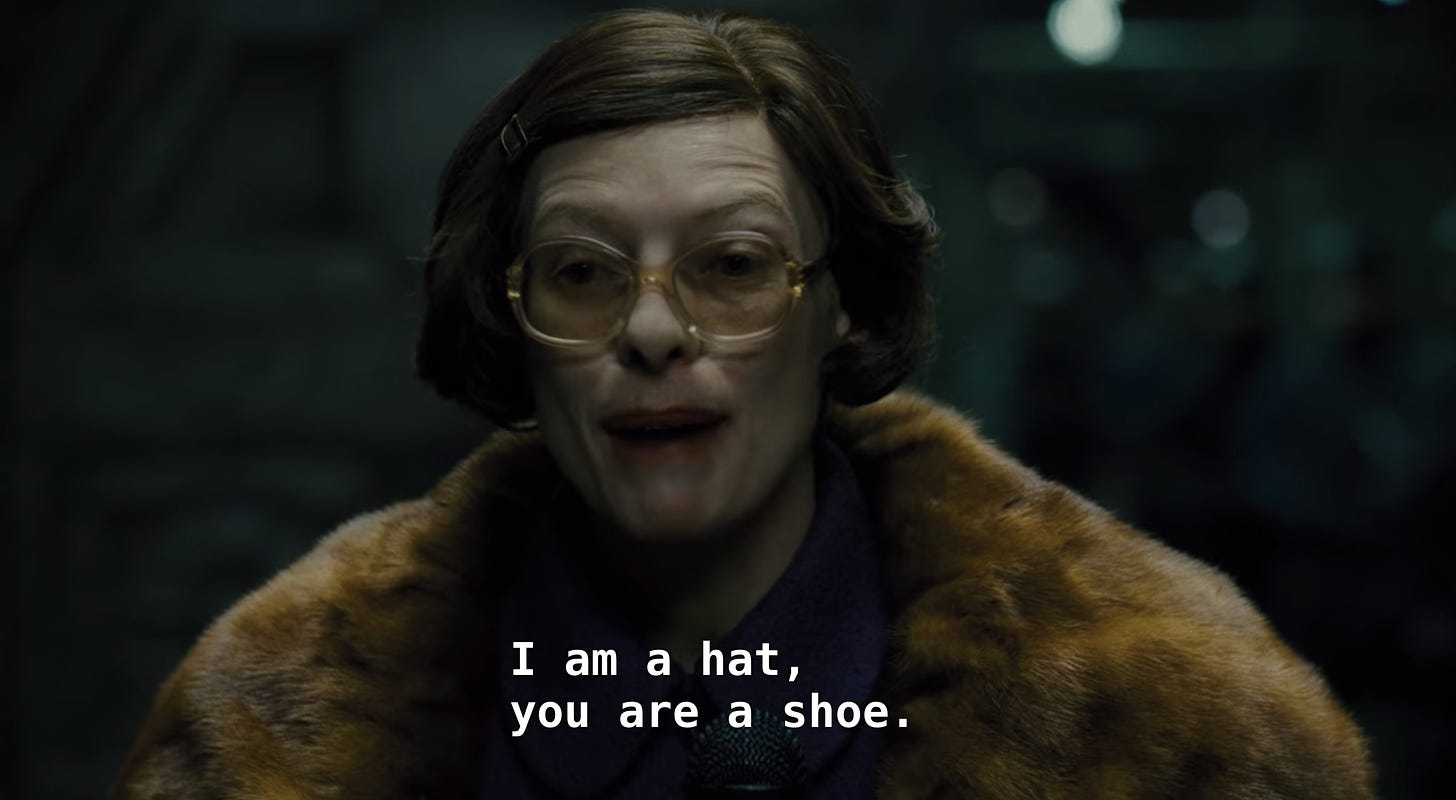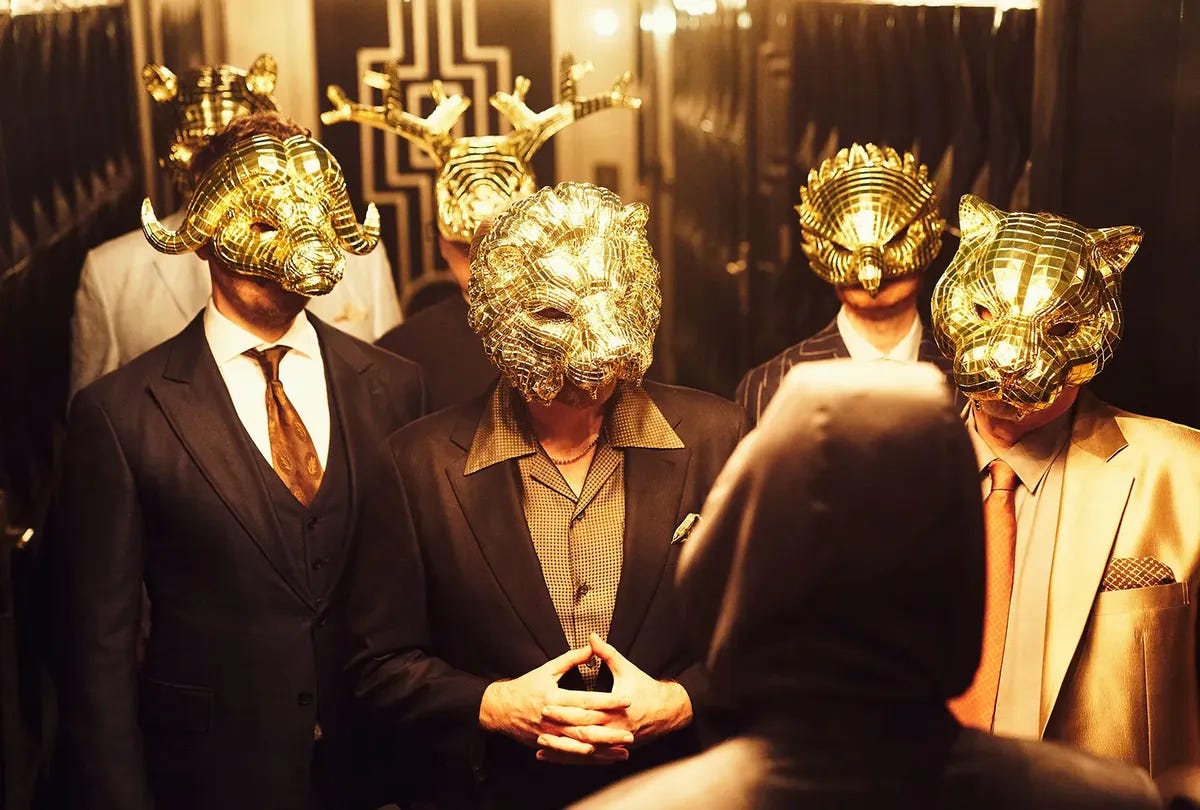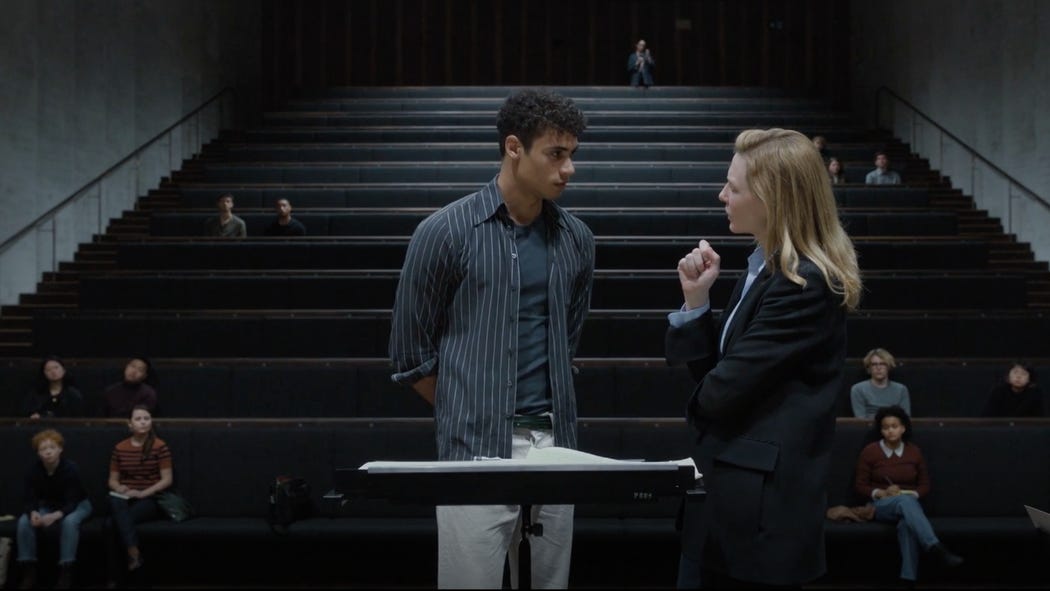One of the great things about brick-and-mortar video rental stores were the few errant shelves dedicated to micro-genres made up by the nerdy store clerks themselves. In those days we had Mumblecore, Body Horror, Misery Porn, Lo Fi Sci Fi, 90s Coming of Age, and Is-it-a-Christmas-Movie? to name a few. Today’s micro-genres might include Nordic Noir, Christian Redemption, Feminist Revenge, and Revisionist Fantasy.
But none compare to the omnipresence of an age old micro-genre that’s been growing for decades and has recently reached fever pitch. The 2000s saw the rise of filmic allegories pitting the lower classes against each other in various death sports. New entrants Squid Game (2021) and The Hunt (2020) followed The Platform (2019), Snowpiercer (2013), the Hunger Games films, Battle Royal (2000), Surviving the Game (1994) and Hard Target (1993). I call this genre Populist Death Match; neatly arranged metaphors for the moral culpability of the ruling class that depict normal everyday people as victims of a rigged game.
The genre derives originally from The Most Dangerous Game, a famous short story published in 1924 about a hunter stranded on an island where rich Cossacks hunt shipwrecked survivors for sport. The Most Dangerous Game became a film in 1932, and was recently remade as both a movie and a Quibi series (the story entered the public domain in 2020). However, the original story probably doesn’t qualify as Populist Death Match because it lacks the narrow sensibility of a genre film—in this instance the assurance that the elite are indeed killing us and thus deserve to die. All entrants in the modern Populist Death Game genre share the structure of rich versus poor in a satisfying fight to the death—a sort of “Populism Porn” where our hatred of the rich is laid bare. It’s an old instinct, but the fact that the genre has become so popular and well-defined speaks volumes about American culture and Hollywood today.
Defining Populist Death Match
Populist Death Match has certain rules—1. the world must be fictional and ahistorical, occurring in a narrowly-defined “stadium.” 2. It must directly comment on class struggle, using the rules of the world as a metaphor for class constraints. 3. Those constraints must be somehow gamified, in the sense that there’s a competition or test to survive.
Snowpiercer, while not exactly a game, still satisfies the criteria because the constraints of the train effectively produce an isolated stadium wherein a game occurs that tests our heroes, ultimately allowing them to destroy the exploitative elite. Running Man (1987) and The Purge films may be also be included, although they’re perhaps a little light on the class element. The “Fifteen Million Merits” episode of Black Mirror definitely counts.
Gamified horror movies like Cube (1997), Saw (2004), Exam (2009), and Circle (2015) don’t qualify, as they replace class with either moral guilt/shame or a Prisoner’s Dilemma. Logan’s Run (1976), The 10th Victim (1965), and Death Race 2000 (1975) aren’t quite Populist Death Matches, because while there’s a gamified sci-fi universe, they lack both a central class allegory and a constrained “stadium”; they’re really more critiques of the bloodthirsty masses than of elites themselves.
Movies like Parasite (2019) and Burning (2018) don’t qualify because there’s no gamification or fictional universe. Elysium (2013) and Metropolis (1927) have fictional universes and class struggles, but no gamification and no stadium. Spartacus (1960), Gladiator (2000), and RRR (2022) have gamification and class struggle but no constrained fictional universe. A similar micro genre is the Dinner Party Death Match movie—The Invitation (2015), Ready or Not (2019), Clue (1985)—but they also don’t contain enough class commentary. Anyway, you get the point.
Populist Death Match Evolved
Traditionally, Populist Death Matches feature the poors exploited by the rich. But as their frequency has increased over time, a new version has emerged. In 2022, three new Populist Death Matches—Glass Onion, The Menu, and Triangle of Sadness—made elites themselves contestants in the game of death. No longer were the rich pulling the strings, watching from behind a two-way mirror as they do so exquisitely in Squid Game (in my opinion the best of the genre). Now the rich are in the arena, either with the poors (Triangle of Sadness), by themselves at the behest of the rich (Glass Onion), or by themselves at the behest of the poor (The Menu).
Two of these movies are terrible and one is great. All three involve beautiful elites, beautiful boats, and beautiful islands where the games of death take place. Glass Onion, a big budget Netflix film and follow up to Knives Out, occurs in a reverse universe where the elites are right wing racists. The libertarian billionaire who sets up the death game, played by Edward Norton, is molded on Elon Musk—as if outspoken right-leaning CEOs are the rule, not the exception.
Glass Onion is of course an unintentional counterfactual—it’s meant to occur in the real world, not an alternate universe. Elite liberal filmmaker Rian Johnson somehow still believes that racist Neocons are in power, and not elite liberal filmmakers like Rian Johnson. The lack of self-awareness causes Glass Onion to fail utterly as a work of art, as none of the elite characters feel real, and thus we receive no satisfaction from their destruction. They are fake elites that only make sense to the actual elites, e.g. Rian Johnson, not the rest of us. Leftists hate the film as much as right wingers—one particularly colorful Marxist review calls it “a ruling class’s dream about itself,” advising “another kind of art is coming; it’ll just take a lot more burning mansions in real life.”
It is interesting, however, that the members of the ruling class who decide what gets greenlit are making Populist Death Match films, even if poorly executed. Another example, The Menu, pits rich foodies in a death match against chefs and servers. At one point, the deranged chef, played by Ralph Fiennes, asks a Hollywood development executive “What school did you go to? Student loans?” When she answers “Brown” and “no,” he says “Sorry, you’re dying.”
This suggests an awareness of the disgust most Americans feel towards the people who control the mainstream media, an awareness that runs totally counter to the effete woke-ism broadcasted by the Academy and every major film studio. But then The Menu catches itself before it can pose any real threat to the worldviews of its executives—it is after all produced by Disney. It apologizes by shoehorning in pointless wokery: at one point the chef instructs a female underling to stab him in either in the d*ck or the thigh (it’s unclear) for hitting on her. Beyond that, The Menu fails because it’s been writer’s-roomed to death, as if its hack director and hack writers were instructed by Disney to “be edgy—no guardrails on this one! But, you know, nothing Trumpy.”
Finally, we have Triangle of Sadness (titled Sans Filtre—No Filter—in French) by Swedish satirist Ruben Ostlund, who previously made Force Majeure (2014) and The Square (2017), both brilliant class send-ups in their own right. ToS is Ostlund’s most angry and heavy-handed film (although The Square also presents a deliciously vicious critique). ToS sees a group of ultra-elites stranded on a desert island with the crew members of their luxury cruise liner. This loose plot serves as a structure upon which to hang all sorts of black mirrors.
In one scene featuring a woke fashion show, a banner on a stage reads something like “CYNICISM DISGUISED AS HOPEFULNESS.” In another, a rich woman, naively believing she’s bonding with the crew members, forces them all to drop what they’re doing and swim in the ocean. Based on other parts of the film, I would guess that Ostland is a dirty commie, but that’s okay. His work more accurately reflects the actual machinations of a hostile, degenerate, and largely hidden elite than anything else out there. I still remember two incredible scenes from The Square: one where a stuffy art society hosts a performance artist who destroys their awards dinner like a deranged violent monkey, and another where a marketing agency attempts to re-create the Ice Bucket Challenge. Both scenes felt incredibly real, suffused with both the rottenness of the globalist elite and their desperation to be on the right side of history.
Hollywood can’t come close to Ostlund-quality satire simply because he wouldn’t be allowed within 1000 feet of a film set in LA (trust me, I know), but the fact that Populist Death Match is peaking suggests that there is some internal pressure to accommodate populist perspectives, whether for money or for art.
Caviar Cope
In a recent article clawing at the same concept, Justin Murphy characterizes a similar trend in modern film, something he calls Caviar Cope. He sweeps The Menu in with The White Lotus and Succession, two contemporary HBO shows that also satirize elites from a more indulgent perspective.
“35-year-old PhD dog-moms with sub-zero net worths love The White Lotus because it's like going on a vacation they can't afford, and it rationalizes their immiseration,” writes Murphy. “But 50-year old billionaires also love The White Lotus because, in their mind, the mockery is not directed at them but the vulgar and neurotic upper-bourgeois who can't just relax and be grateful. The dog-mom thinks she is laughing at the economic elites, and the economic elites think they are laughing at preposterous strivers.”
Disgusted by this paradigm, Murphy decides to throw away his TV.
I’m equally nauseated by shows like White Lotus and Succession. While very-well written and executed, their hero-lessness disturbs me, especially given their popularity. I never feel good after watching them, just sort of tired and gross. They lack inspiring characters or any tension between real moralities. “[R]ight now, the optimized formula is: Grandiose scenery + absurd wealthy people hilariously affirming and negating everything at once + no clear plot or value system that could offend or stress anyone,” describes Murphy.
But, while Populist Death Match derives from the same sensibility as Caviar Cope, I have a different perspective on what’s actually happening. Viewers have always indulged in the ornate lifestyles of the elite, but they haven’t always fantasized about imprisoning, torturing, and murdering them quite so much. Populism is hard to define, but it always contains one essential element—“eat the rich.”
I see the rise in populist allegory films not as cope, but as a genuine vibe shift, a crack in the facade of the globalist media complex, owned as it is by only four or five giant corporations. Populist critique means globalist critique, and so far the globalist ruling class has demonstrated near zero tolerance for criticism or opposing viewpoints. If you question the regime, you’re walled off—dubbed racist, sexist, anti-vaxx, whatever’s needed to protect the masses from your ideas. The problem for the global elites, however, is that as long as free speech exists, there are going to be artists that make fun of the powerful. In fact, they’re our favorite.
Hollywood, having separated as far as it possibly can from its core audience of “dumb racist hicks,” is finally separating from itself. The rise of the Populist Death Match genre signifies a reluctant admission that MAGA was right: coastal elites really do suck after all. Their cynical representation in White Lotus and Succession isn’t just dog mom cope. It’s actual satire from internal defectors like Mike White who undoubtedly make Hollywood’s Deep State—Rian Johnson-type people who willingly destroyed their own crown jewel, the Oscars, in the name of wokeness—very nervous while also making them lots of money.
Other recent examples of this split: Tar (2022) (imho by the best “serious” prestige film released in many years) skewers the elite from yet another perspective, this one through the lens of cancel culture in classical music. Barbarian (2022), a creative new horror film, also assails cancel culture. Neither film is entirely sure what to make of it—they aren’t propaganda films one way or the other. They’re actual art made by actual artists questioning what’s happening around us, even if they ultimately succumb to the pressure to destroy their racist/sexist/abusive bad guys.
Even the regime’s chosen children, safe suburban dorks like Damien Chazelle, can’t ignore the populist perspective. Babylon (2022) amounts to a three hour argument in favor of elites and their brazen hedonism (which populists are told is both a conspiracy theory and “actually a good thing”). It’s all worth it and beautiful if it’s in the name of creating art!! Chazelle screams insecurely. In the first thirty minutes of the film, a midget rides a penis pogo stick, a beautiful woman pisses on a fat man and ODs, an Asian woman sings about her girlfriend’s pussy, and an A-List Movie Star™ snorts literal mounds of cocaine. Weimar plays itself.
Artists are a grumpy bunch, and we aren’t communists yet. As long as we’re allowed to make art, the good ones among us, even in Hollywood, will be tempted to tell the truth. There’s simply no way that this won’t create a rift between filmmakers (the good, young, exciting ones) and their overlords, no matter how political filmmakers become. So far, Hollywood has relegated inconvenient questioners mostly to poorly-made Populist Death Match films and other adjacent “unserious” genre movies. But what is the story of film history if not the rise and fall of genre?










I've been thinking a lot about the Populist Death Match genre lately and only recently watched the series Alice in Borderland, a Netflix series based on a manga. AoB is interesting because at first blush it looks like a Japanese knockoff of Squid Game, then is "not quite" that but still seems very squarely a PDM story, then has a big reveal that the PDM is an illusion- that the "contestants" are more or less prisoners of their own existential despair, in a postmodern prison of their minds' own making.
The genre subversion is a little clearer in the original Japanese dialogue. But I won't swear that I'm not simply reading too much into it and giving it more credit than is due and the PDM subversion was just a pointless twist for the sake of twisting, which Japanese film is wont to do.
This is a astute fascinating article. I only wish there were more details about The Triangle of Sadness.
The vibe shift you speak of is revealing what the Hollywood elite are not yet conscious of.